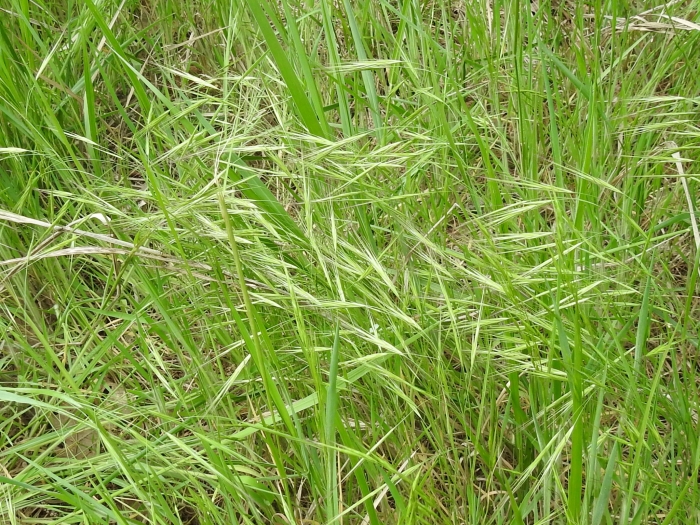Ripgut Brome
(Bromus rigidus)
Ripgut Brome (Bromus rigidus)
/
/

Sam Kieschnick
CC BY 4.0
Image By:
Sam Kieschnick
Recorded By:
Copyright:
CC BY 4.0
Copyright Notice:
Photo by: Sam Kieschnick | License Type: CC BY 4.0 | License URL: http://creativecommons.org/licenses/by/4.0/ | Rights Holder: Sam Kieschnick | Publisher: iNaturalist | Date Created: 2017-04-16T02:27:39-07:00 |
























Estimated Native Range
Summary
Bromus rigidus, commonly known as ripgut brome, is an annual grass that originates from the Mediterranean region of Eurasia and has become naturalized in parts of North America. It typically grows between 0.3 to 3 feet tall and features pubescent (hairy) culms, leaves, and panicle branches. The plant is characterized by its stiff, erect growth habit and dense, spiky inflorescences that can cause injury to grazing animals, hence the common name "ripgut." Flowering occurs in late spring to early summer, and the flowers are not particularly showy, being more functional than ornamental.
Ripgut brome is known for its ability to thrive in disturbed soils and is often found in grasslands, agricultural fields, and along roadsides where it can become a problematic weed. It is not typically cultivated for ornamental purposes due to its invasive nature and potential to outcompete native vegetation. In cultivation, it prefers full sun and can tolerate a range of soil types, but it is often found in dry, sandy, or gravelly soils. Gardeners should be cautious about introducing ripgut brome to their landscapes, as it can become aggressive and difficult to control. It is not recommended for use in gardens or naturalized areas outside its native range due to its invasive potential.CC BY-SA 4.0
Ripgut brome is known for its ability to thrive in disturbed soils and is often found in grasslands, agricultural fields, and along roadsides where it can become a problematic weed. It is not typically cultivated for ornamental purposes due to its invasive nature and potential to outcompete native vegetation. In cultivation, it prefers full sun and can tolerate a range of soil types, but it is often found in dry, sandy, or gravelly soils. Gardeners should be cautious about introducing ripgut brome to their landscapes, as it can become aggressive and difficult to control. It is not recommended for use in gardens or naturalized areas outside its native range due to its invasive potential.CC BY-SA 4.0
Plant Description
- Plant Type: Grass
- Height: 1-3 feet
- Width: 1-2 feet
- Growth Rate: Rapid
- Flower Color: N/A
- Flowering Season: Spring
- Leaf Retention:
Growth Requirements
- Sun: Full Sun
- Water: Low
- Drainage: Medium, Fast
Common Uses
Erosion Control, Low Maintenance
Natural Habitat
Originates from the Mediterranean region of Eurasia and is often found in grasslands and disturbed soils
Other Names
Common Names: Stiff Brome, Rigid Brome
Scientific Names: , Bromus rigidus, Anisantha diandra subsp. rigida, Anisantha diandra var. rigida, Anisantha hispanica, Anisantha rigida, Bromus diandrus subsp. maximus, Bromus diandrus subsp. rigidus, Bromus diandrus subsp. rigidus, Bromus diandrus var. maximus
GBIF Accepted Name: